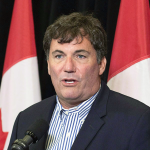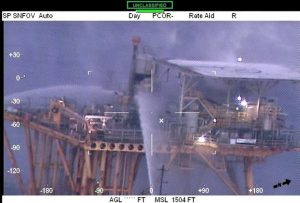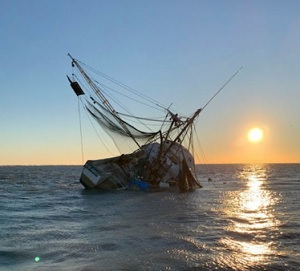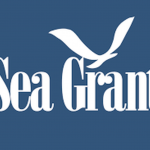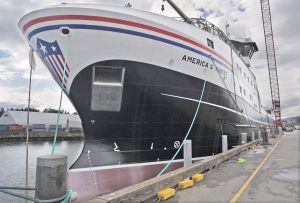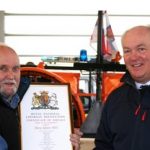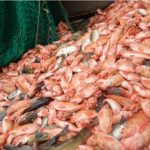Tag Archives: NMFS
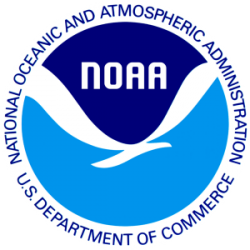
Maine Legislature threatens legal action while Maine Lobstering Union moves ahead – Files Federal Lawsuit
The Maine Legislature is threatening to fight the federal government in court over a set of controversial new seasonal restrictions on lobster harvesting in the Gulf of Maine. Last month, the National Oceanic and Atmospheric Administration released a new set of rules for New England’s lobster fishery aimed at reducing the risk to critically endangered North Atlantic right whales and other whale species. >click to read< The Maine Lobstering Union (MLU) has filed a civil action in the United States District Court for the District of Maine, seeking emergency relief related to the impending closure by agencies of the federal government of productive lobster grounds utilized by Maine’s lobster fishermen and women. >click to read< 11:04
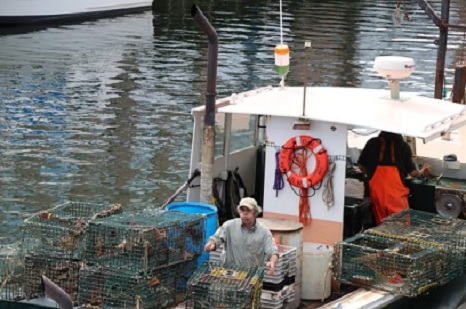
DMR briefs legislature on impact of NOAA’s new lobstering rules, options for appeal
On September 14, the Maine Legislature’s Committee on Marine Resources met and discussed the impact new rules recently released by the NOAA will have on Maine’s lobster industry, as well as the state’s legal options for appealing the rules.,, The new rules not only close nearly 1,000 square miles to lobstering between October and January, a time of year when lobster prices are at their highest, but changes the kind of gear lobstermen can use. Also discussed were threats to the right whale posed by Canada. As Keliher pointed out, the NMFS’ biological opinion noted that even if Maine is  100% successful in taking steps to protect right whales, whales will continue to go extinct if they continue to be hurt in Canada. Keliher also stated that he has had conversations with the head of> NOAA, Richard W. Spinrad, Ph.D < who hasn’t yet had a meeting with the Canadian government, but has agreed to raise the issue of including state representatives in Canadian affairs. Keliher also said NOAA’s head considers these conversations to be a government-to-government issue. He stated he disagrees and continues to press the issue. >click to read< 15:51
100% successful in taking steps to protect right whales, whales will continue to go extinct if they continue to be hurt in Canada. Keliher also stated that he has had conversations with the head of> NOAA, Richard W. Spinrad, Ph.D < who hasn’t yet had a meeting with the Canadian government, but has agreed to raise the issue of including state representatives in Canadian affairs. Keliher also said NOAA’s head considers these conversations to be a government-to-government issue. He stated he disagrees and continues to press the issue. >click to read< 15:51
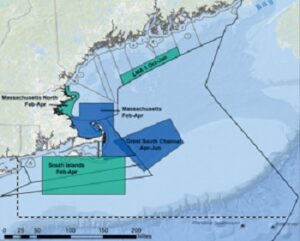
151 Maine legislators call on Biden to rescind new lobster fishing reg’s, while the real threat remains
State legislators have submitted a letter to President Joe Biden requesting (DEMAND!) that his administration take steps to immediately rescind new regulations on lobster fishing. The new regulations, which are intended to protect the endangered North Atlantic right whale,,, Rep. Billy Bob Faulkingham, R-Winter Harbor, a lobster fisherman, initiated the letter. Maine Senate President Troy Jackson also criticized the new reg’s,, “The new 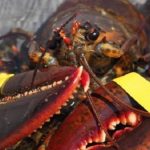 federal regulations are an affront to the men and women who have made a living on Maine’s working waterfront for generations,,, I’m deeply disappointed that NOAA has decided to dismiss the voices of Maine’s lobstering workforce and chosen to go ahead with damaging regulations that do nothing more than hurt our fishermen, while the real threat to right whales remains, Canadian ships.” Video, >click to read< 16:03
federal regulations are an affront to the men and women who have made a living on Maine’s working waterfront for generations,,, I’m deeply disappointed that NOAA has decided to dismiss the voices of Maine’s lobstering workforce and chosen to go ahead with damaging regulations that do nothing more than hurt our fishermen, while the real threat to right whales remains, Canadian ships.” Video, >click to read< 16:03
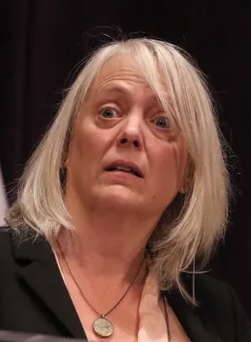
Raimondo picks Janet Coit, a source of trusted counsel, to lead the National Marine Fisheries Service
On Monday, U.S. Secretary of Commerce Gina Raimondo, Coit’s former boss in the Rhode Island State House, announced the selection of Coit to lead the National Oceanic and Atmospheric Administration’s Fisheries office.,, But the work of the fisheries service is getting even harder as it’s faced with stepping into a brewing fight over coastal waters between fishermen and the developers of offshore wind farms. Coit wouldn’t say much about the expectations for her new job in Washington as she waited for the official word to come down from the Commerce Department. But she was certain that offshore wind will be in the mix. “That’s going to be such a hot-button issue that I’m heading into,” she said. >click to read<16:46
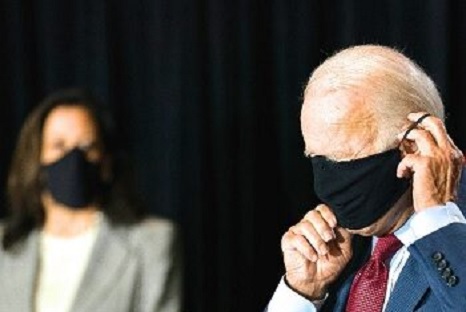
Biden-Harris Administration Approves First Major Offshore Wind Project in U.S. Waters
Today’s Record of Decision (ROD) grants Vineyard Wind final federal approval to install 84 or fewer turbines off Massachusetts as part of an 800-megawatt offshore wind energy facility. The project is expected to create 3,600 area jobs and will power up to 400,000 homes. Turbines will be installed in an east-west orientation, and all the turbines will have a minimum spacing of 1 nautical mile between them in the north-south and east-west directions, consistent with the U.S. Coast Guard recommendations in the Final Massachusetts and Rhode Island Port Access Route Study. >click to read< 15:05
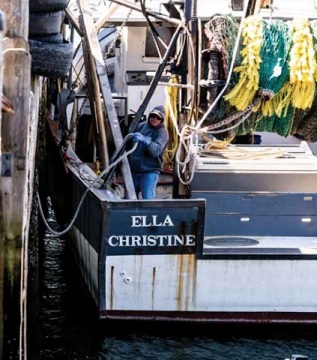
The Last of the Port Clyde Groundfishermen – Once robust, Maine’s groundfishery is on the ropes
When Randy Cushman was growing up in Port Clyde, some 300 trawlers were moored up and down Maine’s coast,,, Today, Cushman is 59 years old and might be Maine’s most knowledgeable commercial fishermen.,, But Cushman is barely scraping by. Prices for cod, flounder, and other groundfish have all but collapsed in Maine. The combination of rock-bottom prices, the need to protect the state’s fish stocks, and a dearth of fishing infrastructure make it harder than ever to be a fisherman here. Today, the robust Maine trawler fleet of Cushman’s youth has been reduced to around 30 boats. photos, >click to read< 14:21
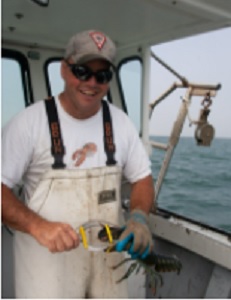
Massachusetts Lobstermen fear end of their livelihood
Dan Pronk is worried a new set of proposed NOAA and NMFS restrictions aimed at saving the North Atlantic right whale could be the nail in the coffin for the lobstering industry on Nantucket. “We’ve got five years left of lobstering down here,” said Pronk, the only commercial lobsterman on Nantucket, and one of only a handful of lobstermen around the region with traps south of Nantucket and Martha’s Vineyard. “It’s career ending if they get their way. We’re bending over backwards to appease these people. >click to read< 13:28

NCLA Seeks Summary Judgment in Case Challenging NOAA’s Unlawful at-Sea Monitor Mandate
The New Civil Liberties Alliance, a nonpartisan, nonprofit civil rights group, has filed a motion asking the U.S. District Court for the District of Rhode Island to award summary judgment in favor of NCLA’s clients in Relentless Inc., et al. v. U.S. Dept. of Commerce, et al. NCLA argues that the U.S. Department of Commerce, the National Oceanic and Atmospheric Administration (NOAA), and the National Marine Fisheries Service have no power to make fishermen pay for monitors the government puts on their boats. So, NCLA is asking the Court to declare NOAA’s regulation seeking to implement an industry-funded, at-sea-monitor mandate on the nation’s Atlantic herring fishermen unconstitutional and set it aside. >click to read<20:31
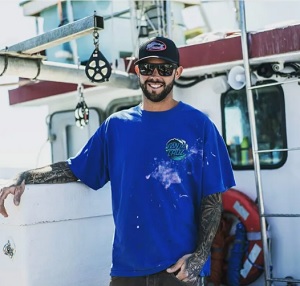
Local Dungeness crab fishermen oppose new fish and wildlife regulations
The regulations are a product of concerns surrounding how often whales and other endangered species are getting caught in the ropes used to fish crabs. The regulations were met with some resistance from the local fishing community. However, conservationists argue the rules will do more good than harm to wildlife. Tim Obert, a fisherman, strongly opposes,,, “You’re driving down the street and you accidentally run over a squirrel or maybe you hit a deer on a mountain road, it doesn’t mean you go park your car in the garage and never turn it on again or never leave your house,” he said. Ben Platt, the President of the California Coast Crab Association, also opposes the regulations,,, >click to read< 08:13

NOAA Fisheries Approves Electronic Reporting Requirements for Mid-Atlantic and New England Commercial Vessels
NOAA Fisheries has approved a recommendation from the Mid-Atlantic and New England Fishery Management Councils to require federally permitted commercial fishing vessels to submit vessel trip reports electronically as eVTRs within 48 hours of the end of a trip. This requirement will take effect November 10, 2021. This action affects all commercial vessels holding federal permits for any species managed by the Mid-Atlantic or New England Fishery Management Councils, >click to read< 14:59
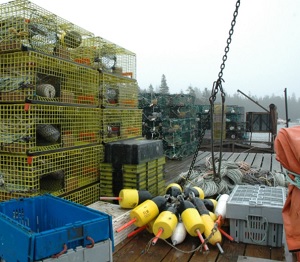
Zone C lobster council OK’s trawl limit plan for new whale protection rules
Zone C Lobster Management Council held a special meeting on the internet in late September to get an update on the situation from Department of Marine Resources Commissioner Patrick Keliher and consider a zone-specific plan for gear modifications that will likely be required by NMFS. On Aug. 19, U.S. District Court Judge James Boasberg gave NMFS nine months to craft new rules to protect endangered right whales from entanglement,,, DMR asked the state’s seven Lobster Zone Management Councils to come up with zone-specific proposals,,, Last week, the Zone C council met to consider the recommendations of its working group. >click to read< 16:07
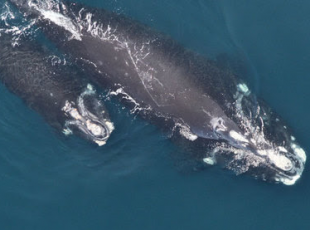
Zone B waits to present recommendation
Even though a deadline to present a state plan designed to minimize potential harm to right whales is fast approaching, members of the Zone B Lobster Management Council asked Department of Marine Resources officials to check numbers for the area 6-12 miles offshore before agreeing to a plan specific to that fishing zone. “The timeline is short,” said DMR Commissioner Pat Keliher,,, While most members of the Zone B council seemed in favor of the subcommittee’s recommendations, there was some hesitation. “I support this; it would work for me,” said Howland. “I’d hate to railroad it if there are some concerns. This is better than it could be, but it doesn’t sound like it’s ideal for some guys.”,, “There’s a side of me that feels like this is getting stuffed down my throat,” said council member James Hanscom after asking if the decision could be tabled. >click to read< 08:09
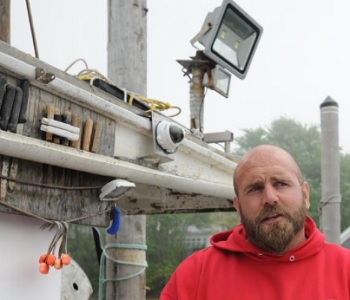
Electronic monitoring long-awaited boon for Cape Cod fishermen
Cape fishermen first started advocating for the use of electronic monitoring in 2006, said Melissa Sanderson, chief operating officer of the Cape Cod Commercial Fishermen’s Alliance. “I would say it’s a long time coming,” said Sanderson of the 14 years it took to finally have approval. But six years ago, Maine fishermen revived interest with their own pilot program and Cape fishermen joined the following year using equipment and technical support provided by The Nature Conservancy and grants from the National Fish and Wildlife Foundation. >click to read< 09:09

District Court judge denies injunction that would shut down lobster and gillnet fishing in Massachusetts
In a hearing Thursday in United States District Court, Judge Indira Talwani denied an injunction that would have shut down lobster and gillnet fishing in Massachusetts to protect critically endangered North Atlantic right whales until a trial seeking that closure takes place. Richard “Max” Strahan, who identifies himself in court documents as a lobster fishermen, whale watcher and “protector of endangered wildlife species,” sued the state Office of Energy and Environmental Affairs last April under the federal Endangered Species Act. >click to read< 11:41
Gloucester: Lobstermen push against whale rules – ‘We’ve borne the brunt’ – >click to read<

Max Strahan driven by “duty” to have stricter measures adopted
To many federal and state fisheries managers, and to most people in the lobster industry, the name Max Strahan conjures images of a fanatic determined to put an end to lobster fishing in the name of saving endangered right whales from extinction. (he is), “I’m a scientist and a very ethical and moral person,” (he’s not) Strahan said, claiming that, of 330 million U.S. citizens, he was the only one to file individual suits under the federal Endangered Species Act (ESA).,, Strahan said he grew up on a farm “somewhere around the area” of New Hampshire and, as a young man, was interested in outdoor activities such as hiking and rock climbing. That led to his interest in wildlife preservation and eventually his efforts to save the endangered spotted owl in the forests of California and Oregon. Strahan filed a petition with the U.S. Fish and Wildlife Service to list the birds under the ESA and ultimately the petition was accepted, the owls listed and much of the Pacific timber industry put out of business. >click to read< 09:39

“Prince of Whales” threatens suit to end Maine lobster licensing
Max Strahan is threatening to go to court. Again. Known by many in the conservation community, on Thursday, Oct. 1, Strahan filed a 60-day notice of his intention to file another lawsuit under the federal and Maine Endangered Species Acts. The suit is against the secretary of commerce, the heads of the National Oceanic and Atmospheric Administration and the National Marine Fisheries Service and Department of Marine Resources Commissioner Patrick Keliher. In his notice, Strahan claims that the act of “licensing” fisheries requiring the use of vertical buoy lines on lobster traps” is, in itself, a violation of the ESA,,, >click to read< 17:46
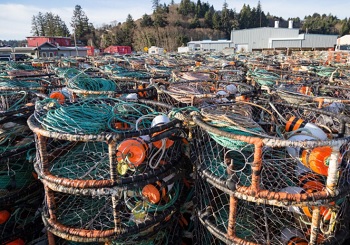
Crab industry, Oregon continue plans to avoid whale entanglement
New regulations for commercial Dungeness crab fishermen in Oregon aim to get boats on the water earlier in the season and reduce the amount of gear to avoid tangling with endangered whales. “Our fleet is made up of 400 individual businesspeople who each bring a different perspective to the issue,” said Hugh Link, the executive director of the Oregon Dungeness Crab Commission. “For over three years, they have been given the opportunity to weigh in on how best to mitigate the whale entanglement risk,” he continued. “But it is an ongoing process. These upcoming meetings are the next important step and we hope they take the opportunity to have their voices heard.”
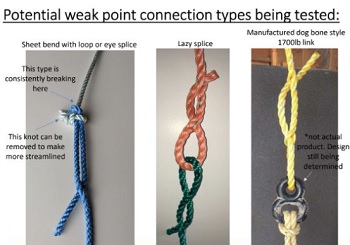
Recommended gear rules for Right Whale safety are adopted
With the National Oceanic Administration’s National Marine Fisheries Service (NMFS) under a fast approaching, court-imposed deadline to develop new whale protection rules, the Zone C Lobster Management Council held a special meeting last week to get an update on the situation from Department of Marine Resources Commissioner Patrick Keliher. The meeting was also an opportunity to consider a zone-specific plan for gear modifications that will likely be required by NMFS. As with many things occurring during the ongoing coronavirus pandemic, the meeting took place in cyberspace. >click to read< 14:43
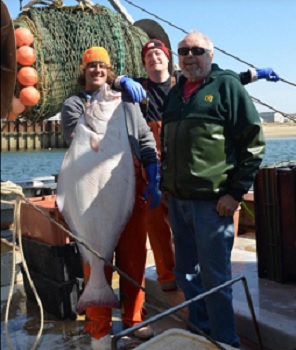
‘Amazing’ halibut, one of the largest fish in the Gulf of Maine, are making a comeback
Halibut are one of the largest fish in the Gulf of Maine, second only to bluefin tuna, swordfish and large sharks. Historically they were a mainstay of the fishing industry along with cod. The National Marine Fishery Service began regulating the halibut fishery in the 1990s and there is a one fish per trip per boat limit on catch. This has been a boon to their rebound. This past spring while fishing for haddock my husband, David, caught four huge halibut. They ranged in size from 40 to 60 pounds. In the past, he has caught one or two a year which were large enough to be legal to keep. The current minimum size is 41 inches. My husband caught two halibut near Jeffrey’s ledge in the mid-1990s which weighed 120 to 140 pounds.,, but David has noticed a strange thing about halibut, they seem to swim in pairs. >click to read< 15:29

SCRUB OBSERVERS ON FISHING TRIPS!
From all indications, on August 14, National Oceanic and Atmospheric Administration commercial fishing monitors will be back looking for a journey unless NOAA steps in and waives the requirement for data-collecting observers during the COVID-19 pandemic. The information human observers collect can be temporarily gathered through electronic surveillance, but a momentary waiver has to come directly through your two U.S. Senators and one U.S. Representative in Washington. Let them know as soon as possible because if you don’t email or call them now, don’t think anyone else is going to do this for you. >click to read< 08:11

Re-Deploying Observers and At-Sea Monitors: Northeast Observer Waiver Extended Through July 31, 2020
Although we had announced plans to resume observer deployments on July 1, we recognize the Coronavirus pandemic continues to evolve and as such, has required us to re-evaluate and adapt to changing circumstances. In response, NOAA Fisheries is extending the waiver granted to vessels with Greater Atlantic Region fishing permits to carry human observers or at-sea monitors through July 31, 2020. This action is authorized by 50 CFR 648.11, which provides the Greater Atlantic Regional Administrator authority to waive observer requirements, and is also consistent with the criteria described in the agency’s emergency rule on observer waivers during the COVID-19 pandemic. >click to read< 16:00

Update on Fishery Observer Program Restart, Which Resumes July 1st
On May 29, NOAA Fisheries announced that on July 1, the waiver of fishery monitoring will expire, and we will begin deploying observers and at-sea monitors on vessels fishing in northeast fisheries. In a letter released today, Northeast Fisheries Science Center Director Jon Hare is providing an update on preparations for a safe and efficient redeployment. For more details and to download the letter, >click to read< 18:30

Judge James Boasberg’s court ruling puts future of Maine lobster industry at risk
United States District Judge James Boasberg’s order found that the National Marine and Fishery Services violated the Endangered Species Act by licensing the lobster fishery. In the second phase of the case, the judge will decide what action is necessary to rectify the situation. The Maine Lobstermen’s Association, an intervenor, and other industry stakeholders around the Gulf of Maine, will submit information for the judge to consider in his ruling.,, Activist Richard Strahan filed a motion in federal court in Bangor to stop fishing in Maine May 15, citing violations of the Endangered Species Act, Maine Public reported. The Maine Department of Marine Resources has no intention of curtailing lobster permits, said spokesperson Jeff Nichols. >click to read< 09:45
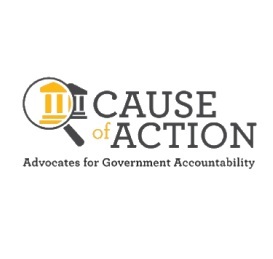
Family Fishermen Move to Block Industry-Killing At-Sea Monitoring Rule
Cause of Action Institute (CoA Institute) today filed a motion for summary judgement on behalf of a group of New Jersey fishermen, asking a D.C. Federal Court to vacate job-killing fisheries regulations called the “Omnibus Amendment.” CoA Institute filed suit in February to challenge the industry-killing rule, which requires certain boats in the Atlantic herring fishery to carry “at-sea monitors” at their own cost. The Omnibus Amendment—designed by the New England Fishery Management Council (NEFMC) and finalized by the National Oceanic and Atmospheric Administration and the Department of Commerce—is expected to cost fishermen upwards of $700 a day, leading to a projected 20% drop in returns-to-owner (profit). Not only is this industry already overregulated, but the agencies are forcing this unlawful rule upon fisherman without any statutory authority to do so. >click to read< 15:25

Court Finds American Lobster Fishery Requires Incidental Take Statement for Impacts on North Atlantic Right Whale
As commercial fisheries across the United States continue to adjust operations in the face of new legal requirements, such as the shift from single-species to ecosystem-based management, one challenge in particular has dominated the courts: the Endangered Species Act (ESA). Recent court decisions have vacated commercial longline fishing permits in federal waters off the coast of California that could endanger the Pacific leatherback sea turtle and restored prohibitions on gillnet fishing gear in a known New England feeding ground for the endangered North Atlantic right whale. This trend continued on April 9, when a federal district court judge in Center for Biological Diversity,,,The American lobster fishery is managed cooperatively by the Atlantic States Marine Fisheries Commission and NMFS, >click to read< 14:45
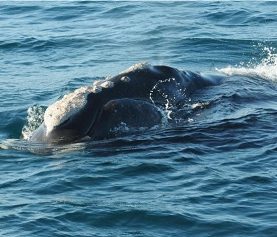
Ruling in whale case signals turmoil for lobster industry
It is too early to know exactly how the ruling in a lawsuit brought by a group of environmental organizations will affect the lobster industry. U.S. District Court Judge James Boasberg asked those groups and NOAA to file briefs suggesting an appropriate “injunctive remedy” against further violations of the Endangered Species Act. Whatever that remedy may be, it is likely to come soon and have a significant impact on Maine lobstermen. During the past several months, Department of Marine Resources Commissioner Patrick Keliher hosted a series of meetings along the coast with members of the lobster industry,, Throughout the process, Keliher warned that the pending federal lawsuit against NOAA was a “wild card” that could affect the regulatory process in undetermined ways. Last week, Keliher said that with the release of the court’s decision the wild card had been played. >click to read< 17:51

With Coronavirus pandemic ravaging our country, temporary relaxation of fishery regulations is urged to help fishing industry
Thanks to our Senators and Congressmen who worked to get specific aid to the fishing industry, that has been hit particularly hard by the closure of restaurants, where 70 per cent of seafood in this country is consumed. Fishermen and wholesalers have had to adapt on the fly and find other ways to market their product to various degrees of success. The closure of so many vital aspects of our domestic economy will have effects that will still be felt a long time after the Virus is tamed.,, I am requesting that NMFS immediately contact the various management councils and commissions to request that special meetings [webinars] of fishery advisory panels be held to discuss the pro’s and cons of this idea, and what fisheries could benefit.,,, By Jim Lovgren. >click to read< 20:48
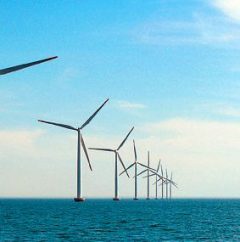
New England: Fishing Industry and offshore windfarmers no closer to finding solutions
The National Marine Fisheries Service and the National Oceanic and Atmospheric Administration, had refused to endorse BOEM’s draft EIS for Vineyard, complaining that fishing concerns were not addressed adequately. This helped trigger the government’s ongoing analysis of offshore wind’s cumulative impacts in the region.,, In public comments on the USCG port-access study, Meghan Lapp, fisheries liaison for frozen fish supplier Seafreeze, a subsidiary of Spain-based conglomerate Grupo Profand, called for the lanes.,, Lapp also called for an assurance of maritime safety that she said would be compromised by radar interference from wind turbines. >click to read< 08:34
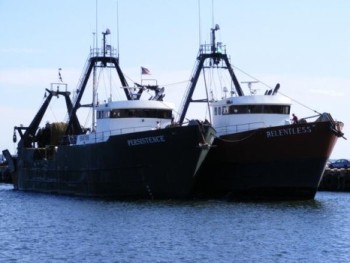
NCLA Sues Commerce, NOAA, NMFS over Its Unlawful New at-Sea Monitor Mandate
The New Civil Liberties Alliance today filed a lawsuit in the U.S. District Court of Rhode Island,,, The suit challenges the agencies’ unconstitutional and statutorily unauthorized effort to force fishing companies to pay for a new agency enforcement program. NCLA represents Relentless Inc., Huntress Inc., and their related company, Seafreeze Fleet LLC,,, The at-sea monitor mandate for the nation’s Atlantic herring fleet violates the U.S. Constitution’s Article I, and the agencies have exceeded the bounds of their statutory authority because Congress never allowed these agencies to create or to require the industry to finance at-sea monitors or an at-sea monitoring program in the Atlantic herring fishery. more >click to read< 15:07
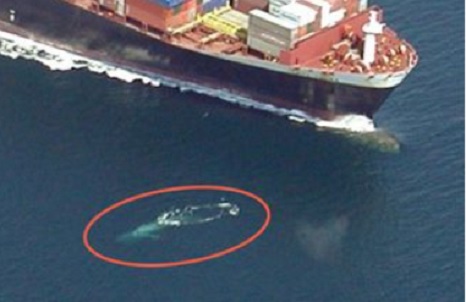
Enviro group says it may sue NMFS and Coast Guard to prevent whale deaths from ship strikes
The Center for Biological Diversity, which has an office in Los Angeles, alleges that the government agencies are ignoring the requirements of the Endangered Species Act in agency consultations, studies and actions such as speed limits in shipping lanes or protecting critical habitat areas. Ship strikes are a leading cause of death and injuries to whales migrating along California’s coast and are more lethal than previously understood >click to read< 16:22


































